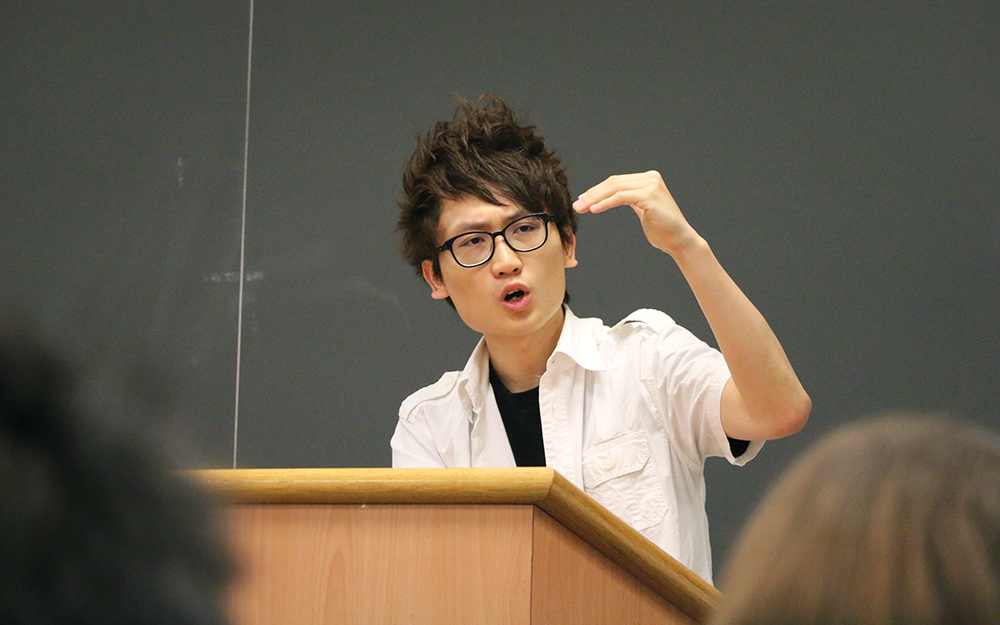During ongoing political turmoil in Hong Kong, continued public demonstrations are necessary to emphasize democratic values, activist Jeffrey Ngo said in an event Sept. 25.
The event, titled “History Before Your Eyes: Chronicling Hong Kong’s Summer of Discontent,” was part of the Asia in Depth Series hosted by the department of history. Ngo, a Hong Kong native and second year Ph.D. student in the department of history, discussed his own experience as a protester in Hong Kong.
Hong Kong’s chief executive, Carrie Lam, introduced legislation in February that would allow the extradition of criminal suspects from Hong Kong to mainland China, which ignited large scale protests across the city as well as discourse about the topic on Georgetown’s campus. Lam has since withdrawn the bill, but protestors have issued broader demands for institutional reforms in Hong Kong, such as addressing police brutality and increasing democratic freedom.

Hong Kong fell back under Chinese rule in 1997 after more than 150 years of British colonial rule, and currently functions under a “one country, two systems” policy that allows the region a significant level of autonomy. The extradition bill concerned Hong Kong citizens because of the Chinese government’s history of political encroachment in the region, according to Ngo.
“Hong Kong’s autonomy being eroded by Chinese interference has been on the back of Hong Kongers’ minds for some time now, so when the extradition bill was proposed, Hong Kongers were worried,” Ngo said.
After recognizing the ineffectiveness of peaceful protests, demonstrators turned to more drastic tactics, including throwing bricks and petrol bombs at police, Ngo said. Escalated tactics, adopted after Lam suspended the extradition bill without fully withdrawing it, have been more effective, according to Ngo.
“For so long, the protests in Hong Kong have been known for being peaceful. Not a single piece of glass would be broken, nor would a car be burned,” Ngo said. “If you stick with peaceful protests, the government won’t listen. If you’re willing to take further steps, then that’s what is going to change the government’s mind.”
The 2019 Hong Kong protests were preceded by numerous pro-democracy demonstrations in earlier years. In 2014, a three month demonstration dubbed the “Umbrella Revolution” included thousands of civilians who clogged major roadways to protest a candidate pre-screening policy for the region’s 2017 chief executive election introduced by the Chinese government.
Earlier this month, Ngo authored a series of back-and-forth chalk messages left in Red Square surrounding the Hong Kong protest. The messages helped bring awareness of the protests in Hong Kong to campus, according to Ngo.
The lack of hierarchy in the organization of the Hong Kong demonstrations has also contributed to their effectiveness, Ngo said.
“This is going to be a movement not based on hierarchies, but based on networks,” Ngo told the audience. “You can do whatever you want, and I’m not going to criticize you and vice versa because we can all pursue the same goal with different methods as long as we know what we have in mind and as long as we support each other in that way.”
On Wednesday, hours before Ngo spoke, the House and Senate Foreign Affairs Committees approved the Hong Kong Human Rights and Democracy Act, which would impose sanctions on Chinese officials accused of debasing Hong Kong autonomy. Ngo collaborated with legislators on the bill.
The original movement has evolved into a broader petition for structural reform in Hong Kong, Ngo said.
“The movement has moved so far beyond just one person, hence no one calling for her resignation now, and is so much more than the extradition bill, hence no one really caring whether the bill is dropped now but about structural change in Hong Kong,” according to Ngo.
Hong Kong citizens have a responsibility to shed light on the authoritarian practices of the Chinese government due to the region’s relative autonomy, Ngo said.
“Hong Kongers must use our relative freedom to other places that are under repression of the Chinese authorities to show the world what is happening,” Ngo said.




















